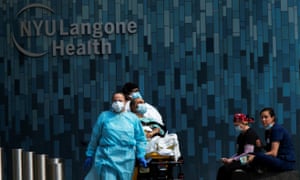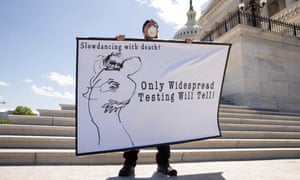- Trump administration privately predicts major increase
- Supreme court livestreams arguments for first time in history
- US cases at 1,157,875 according to Johns Hopkins data
- McConnell could yet pay price for ‘tone deaf’ response
- Live global updates
- See all our coronavirus coverage
- Get a fresh perspective on America – sign up to our First Thing newsletter
Updated

Photograph: Eduardo Muñoz/Reuters
16:43
California to reopen some businesses on Friday
16:30
Today so far
13:24
White House contradicts report of internal death toll projection
13:01
Today so far
11:54
Trump administration predicts daily death toll will double next month – report
10:53
Senate to return today
10:16
Secretary of Senate says it has ‘no discretion’ to release alleged Biden complaint
17:45
The influential Institute for Health Metrics and Evaluation at the University of Washington (IHME), has revised a key piece of coronavirus modeling – almost doubling its prediction of the number of Americans likely to be killed by coronavirus, forecasting at least 134,000 deaths in the US by early August. Previously it had predicted just over 74,000 deaths.
The IHME’s modeling has been cited by the White House coronavirus task force at its once-frequent briefings, which petered out last week.
Christopher Murray, director of the IHME, said the team is gathering data about Americans’ mobility and pointed out that, among other factors influencing the upward trajectory, key data are being studied and processed to “reflect the effect of premature relaxation of social distance, which has a substantial effect”. The university is planning to issue further details, as many states coast to coast plan partial a reopening of society and business.
The IHME revision comes as reports on the White House’s internal projections have raised questions about the safety of reopening strategies across the country.
More from the Guardian on coronavirus modeling:
17:25
16:52
French president Emmanuel Macron said he is confident that the United States will join a global pledge for research to find a vaccine against the new coronavirus.
World leaders, organizations and banks on Monday pledged to give 7.4 billion euros ($8 billion) during a videoconference summit hosted by the European Union. The US, along with Russia, were notably absent from the event, the AP writes.
Macron, who donated 500 million euros on behalf of France, noted that the US “are on the sidelines” but added that it doesn’t compromise or slow down the initiative.Speaking from the Elysee palace in Paris, he said he discussed the issue with President Donald Trump and is convinced that the US will at some point join the initiative, consisting in finding a vaccine as quickly as possible and making it available to all countries.
Macron added that his government is in permanent dialogue with the Trump administration and with American companies. The Guardian has covered more on this topic in our global coronavirus live blog.
16:50
16:43
California to reopen some businesses on Friday
16:30
Today so far
Updated
16:07
15:47
15:25
Man in the mask
Senate majority leader Mitch McConnell is seen here wearing a mask as he returns to the Senate to resume the body’s regular business today.
Burgess Everett
(@burgessev)McConnell dons mask as he opens the Senate pic.twitter.com/HumqOMuwVF
May 4, 2020
More financial relief in the face of the coronavirus pandemic may be top of many Americans’ minds, but there is routine business on the chamber’s agenda, too.
The Senate will take up the nomination of Robert Feitel to be the next inspector general for the Nuclear Regulatory Commission today, NPR reports.
Tomorrow, the Senate intelligence committee will hear from Trump’s nominee for director of national intelligence, Republican Texas Representative John Ratcliffe.
Senators will also work on the confirmation of more federal judges and they’ll hold hearings.
All kinds of social distancing measures are now in place at the Capitol, with meetings, formal lunches and other business in many cases being switched to larger venues.

Updated
15:03
14:45
14:23
14:10
A prominent public advocacy group is calling on Gilead, the pharmaceutical company behind a potential Covid-19 treatment, to price its drug at $1 per day. Gilead is well known for pricing its Hepatitis C drug, Harvoni, at $1,000 per pill. The initial price helped fuel early criticism of drug company pricing, and strained state budgets.
“If Gilead intends to price remdesivir at more than $1 per day, Gilead must fully disclose its research and development costs and all public contributions associated with remdesivir’s development,” said Peter Maybarduk, director of access to medicines at advocacy group Public Citizen. “Then payers and independent experts can analyze again what constitutes fair pricing in a pandemic.”
Early trials of the Gilead drug remdesivir have found it could help treat severe cases of Covid-19, though conflicting data remains. Data from the trials being conducted by the US National Institutes of Health are still preliminary, though researchers have said they show promise. The US Food and Drug Administration gave emergency use authorization for doctors to use the drug for severely ill patients.
Maybarduk said Gilead has benefitted from $60m in taxpayer-funded trials and research throughout remdesivir’s development. Researchers at the University of Liverpool has suggested a price of $0.93 per dose would cover Gilead’s cost of manufacturing and provide the company with a reasonable profit.
“Gilead should commit its patents and know-how to the public domain so that researchers around the world can help bring manufacturing to scale,” said Maybarduk.
13:54
13:37

.png?width=140&height=140&quality=85&auto=format&fit=max&s=fc0062852e4b3d486ba461a9bbfa18ba)

.png?width=140&height=140&quality=85&auto=format&fit=max&s=32ea9797a92d7f3aaeca5c2eadf8ffbf)


